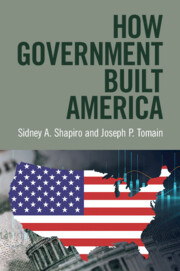Book contents
- How Government Built America
- How Government Built America
- Copyright page
- Dedication
- Contents
- Preface
- 1 Introduction
- 2 The Founders’ America
- 3 Abraham Lincoln’s America
- 4 Ida Tarbell’s America
- 5 Franklin Delano Roosevelt’s America
- 6 Dwight Eisenhower’s America
- 7 Rachel Carson’s America
- 8 John Lewis’s America
- 9 Alfred Kahn’s America
- 10 Ronald Reagan’s America
- 11 Mitch McConnell’s America
- 12 Donald Trump’s America
- 13 Anthony Fauci’s America
- 14 Joe Biden’s America
- 15 Conclusion
- Notes
- Index
11 - Mitch McConnell’s America
Court Packing
Published online by Cambridge University Press: 08 May 2024
- How Government Built America
- How Government Built America
- Copyright page
- Dedication
- Contents
- Preface
- 1 Introduction
- 2 The Founders’ America
- 3 Abraham Lincoln’s America
- 4 Ida Tarbell’s America
- 5 Franklin Delano Roosevelt’s America
- 6 Dwight Eisenhower’s America
- 7 Rachel Carson’s America
- 8 John Lewis’s America
- 9 Alfred Kahn’s America
- 10 Ronald Reagan’s America
- 11 Mitch McConnell’s America
- 12 Donald Trump’s America
- 13 Anthony Fauci’s America
- 14 Joe Biden’s America
- 15 Conclusion
- Notes
- Index
Summary
The United States Supreme Court, under the Constitution, is intended to be one of three coequal branches of government. Most recently, however, it has played an outsized role. Republican Senator Mitch McConnell from Kentucky has been the chief architect in pushing the federal judiciary in a more conservative direction and nowhere more so than on the United States Supreme Court. This chapter presents a view of how the Supreme Court is intended to operate and argues that today’s Court is exceedingly political. McConnell engineered the placement of three very conservative justices on the Court giving the Court its current 6-3 conservative majority. By reviewing key cases and arguing that the current Court is rejecting much of Supreme Court and constitutional law history, we demonstrate the Court’s rightward shift. As an ideal, we like the Court to be as politically neutral as possible, and we would like it to find and not make the law. However, as we discuss, given the role the Court plays in constitutional interpretation, it is inevitable that it will make the law and that politics will influence its decision-making. This chapter also argues that today’s Court may be the most politicized Court in our lifetimes, if not in our history.
- Type
- Chapter
- Information
- How Government Built America , pp. 131 - 147Publisher: Cambridge University PressPrint publication year: 2024

